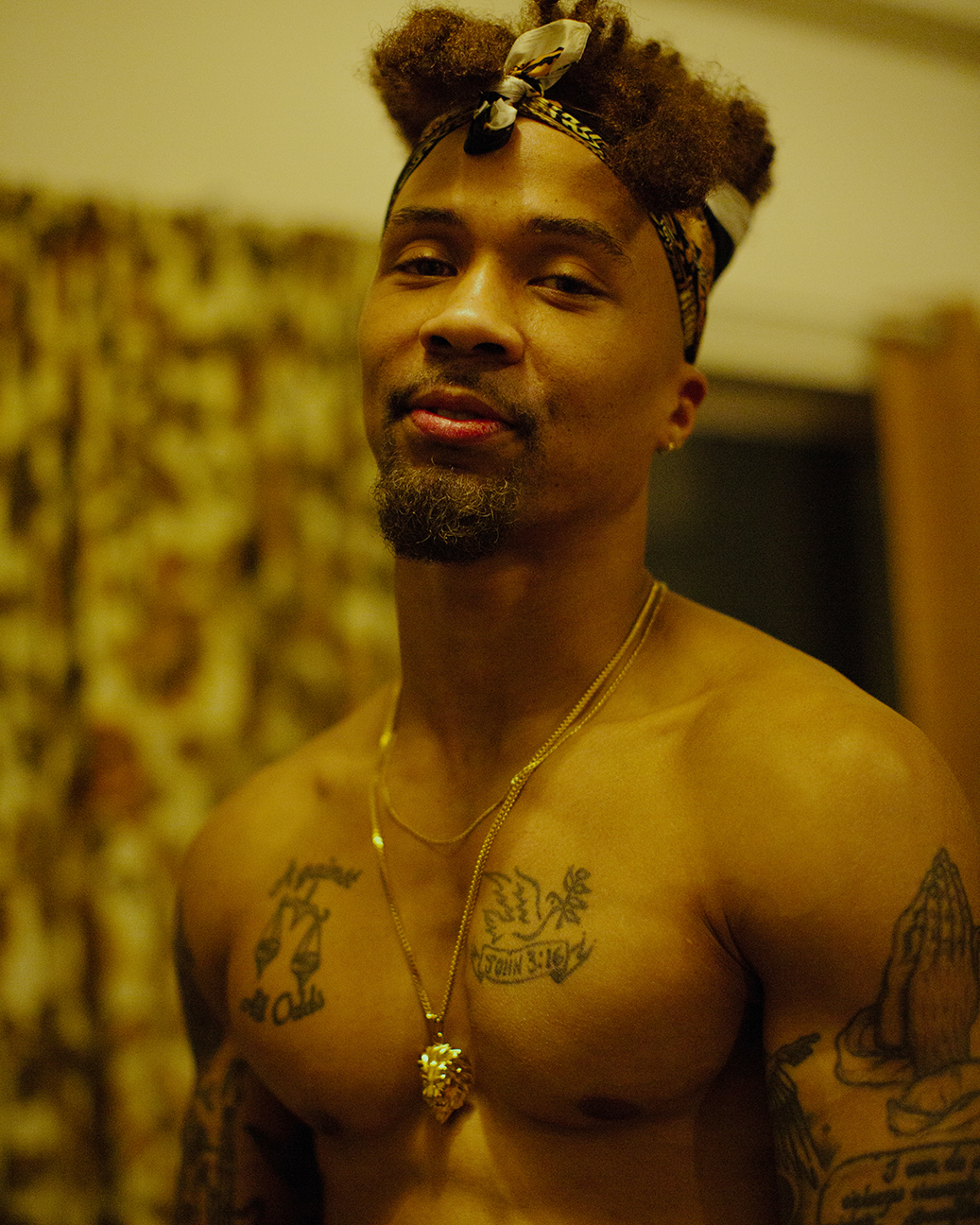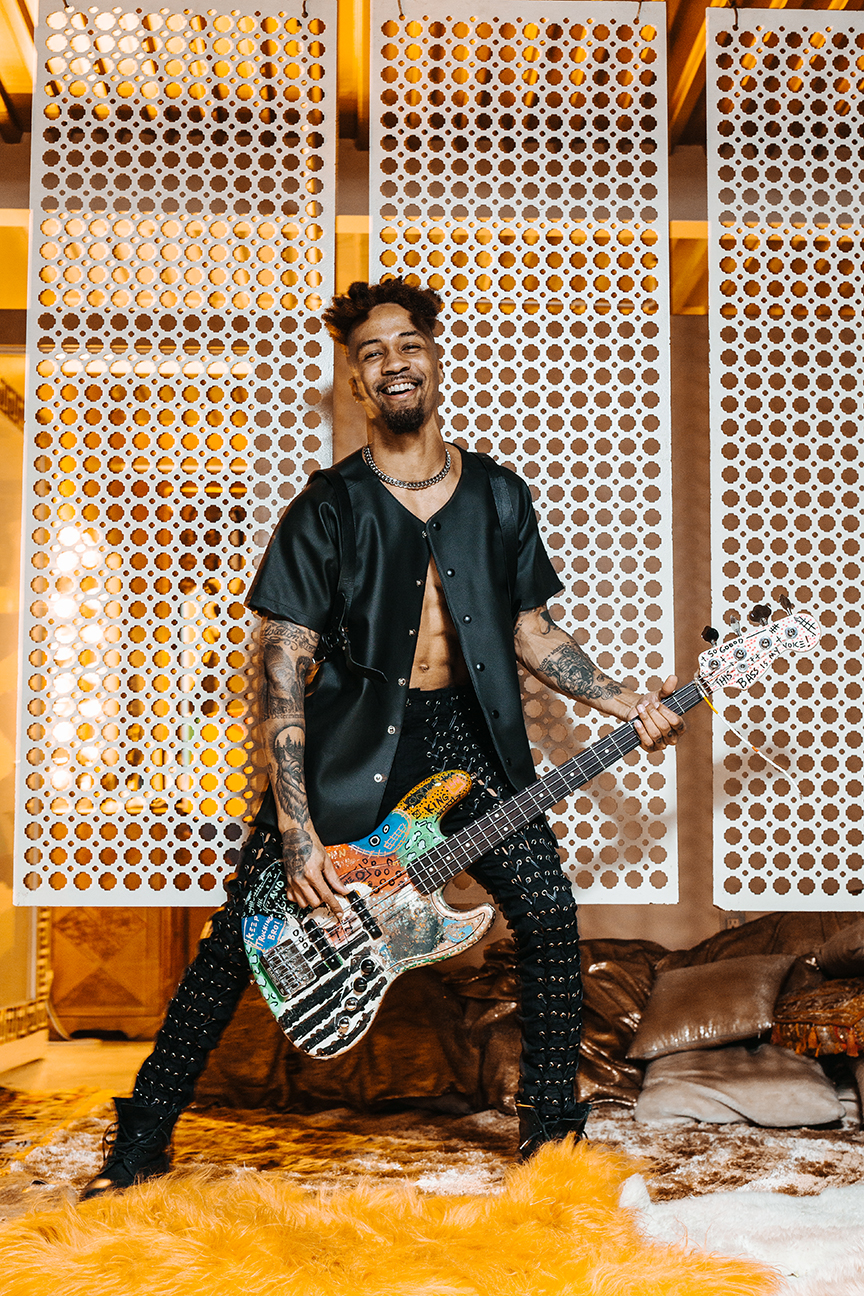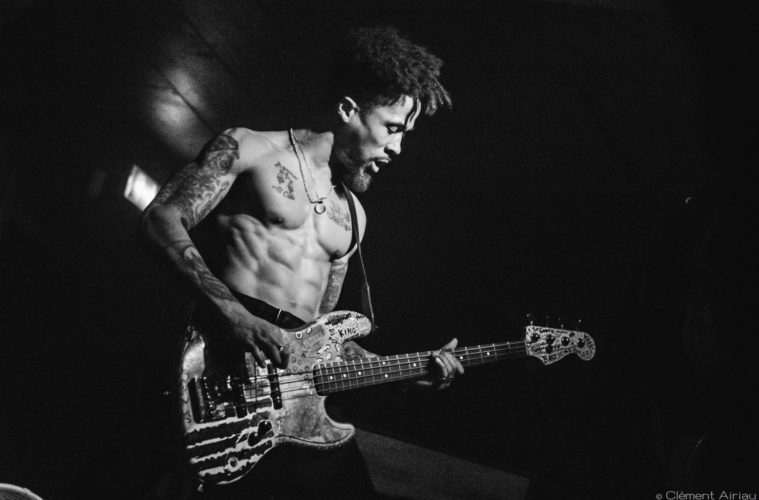It’s often said that an adult will experience multiple career changes throughout their life. There is no greater proof of this than Jonny Goood.
Today, he is a talented musician working as Lady Gaga’s bass guitarist. Over the years he has had the opportunity to play with artists like Miley Cyrus, The Weeknd, Joe Jonas, and his good friend Wiz Khalifa. Recently, he’s been hard at work on his album, Bass Hop. And his new song “California Dreamin’” just hit the airwaves.
His favorite thing about the musicians he works with? Their versatility – especially Lady Gaga’s.
“I find it comforting to be around that kind of versatility, because it shows me that I too can be who I am, be out of the box and be free with that,” says Jonny. “We live in a generation where being put in a box is so easy.”
Perhaps one of the highlights of his career, playing bass for Gaga meant performing in her iconic 2017 Super Bowl halftime show.

(Jonny Goood)
“When you take it up to the Super Bowl, the pressure is almost unbearable,” he confides. “It’s almost like on one flip side of the coin you’re shitting your pants because you’re so excited you know, you’re about to be written down as a part of history, but on the other token, you’re shitting your pants because you don’t want to fuck up.”
Jonny doesn’t mince words when speaking on the duality of being overjoyed with opportunity and overcome with nervousness.
“Yeah it sucked,” he laughs. “We all live to be on stage, but you put the pressure on yourself because you want to do great and want to be great.”
Wanting to be great is a common theme in Jonny’s professional life. Before he was Jonny Goood the artist, he was Jonathan Drummond of the Savannah Police Department.
“I loved it, I had a great experience,” recounts Jonny. “Part of me misses it, you know, because you need those good people in those uniforms.”
On this week’s episode of the L.A. Weekly podcast, host and Publisher Brian Calle interviews Jonny on his transition from cop to rock, and what his insights are as a former police officer in the south.
“I was able to be a cop then turn around and be a musician because I understand that I’m here to experience and gain wisdom and knowledge through my walk as a human, that’s why I chose to be a police officer,” he explains.
Jonny comes from a long line of officers. His father has been a cop for over 30 years, and is now a sergeant. Both he and his brother followed their father into the force, and while Jonny quit to pursue a more musical dream, his brother still wears the badge today.
“It’s a weird feeling, coming from a family of police officers knowing that they’re out there to do good, but also seeing these people over here on your right choking people out and using excessive force. It sucks,” Jonny shares. “I wish there were more cops like my dad.”
Jonny takes pride in his family’s police force legacy, and wants to remind us that while there are no doubt bad cops, there are also some very good ones.
 “All we see right now is the bad … people really don’t care to see those stories [the good stories],” he dismays. “I stand in the firm belief that there are good and righteous people in the blue world, as well as the wicked in the blue world. It’s a tough conversation.”
“All we see right now is the bad … people really don’t care to see those stories [the good stories],” he dismays. “I stand in the firm belief that there are good and righteous people in the blue world, as well as the wicked in the blue world. It’s a tough conversation.”
As a black man who was a police officer, he’s experienced all sides of the spectrum, and brings a unique and educated viewpoint to today’s challenges and controversies.
One thing he’d like to discuss? Overuse of the word “ally.”
“That word is going viral now, but I feel like even that is divisive,” he tells Brian. “I don’t believe in enemies and allies when it comes to the one human race. We may be all different shades of brown – some may say black, some may say white – an ally is your brother.”
“Today, 2020, it doesn’t make you an ally being that you believe the way I believe,” Jonny educates. “It just makes you a brother or a sister, we’re in it together. If you think right and you do right, we’re in it together. If you’re out to divide us or be divisive, you are our enemy.”
In his years of reporting, Brian has been witness to so much injustice in America’s court system. From what he’s seen, it’s almost impossible to get a conviction against a cop, no matter the evidence mounted against them. As a former police officer promoting unity over labels, Brian presses Jonny for his opinion on judicial injustice.
“That has been the decade after decade after decade long question,” he responds.
“I don’t want to live in a world where they’re putting knees on black people’s necks,” answers Jonny. “I think it starts with re-education.”
“Everyone’s saying defund the police,” he elaborates. “But would you want to eat a pizza that you only paid a dollar for? So I think if anything we need to re-educate the police and retrain the police, but the cops that work like my dad and brother – when I was a cop I was making $32,000 dollars [a year] – they’re already defunded. I don’t know who’s seeing the billions of dollars, I don’t know who is getting paid what, but I know a lot of the boots on the ground, they’re not really being paid anyway. And that’s part of the issue. You should pay them more so that you can hire a better quality and caliber of person. I think the lower you lower the standards, if you defund them all the way, then anyone can be a cop.”
“I hate to say this is the country we live in, but the whole system beyond policing needs to be reformed,” he says, speaking on the lack of convictions and prosecution for crimes we are witnessing. “The George Floyd incident was just the tip of the iceberg for what’s been going on.”
“I think it goes beyond policing,” agrees Brian. “People are taught at a young age to be fearful of black men.”
“YEAH. And it sucks man,” Jonny replies emphatically. “The reason we ain’t seen no changes is it’s been the same people in power for 50 years.”
“We still need to uplift the ones that are actually doing righteous or actually doing good jobs,” Jonny tells us. “And if that means kicking everyone out who has over two complaints, then good. But there are some that have never had complaints.”
For Jonny, it all comes back to unity. Everyone being held to the same standards, and everyone acknowledging the humanity of one another.
His reminder to us all?
“We all bleed the same color, we all feel pain, we all love.” Act accordingly.
The interview in its entirety can be found: iTunes, Spotify, Cumulus Los Angeles.
Advertising disclosure: We may receive compensation for some of the links in our stories. Thank you for supporting LA Weekly and our advertisers.

